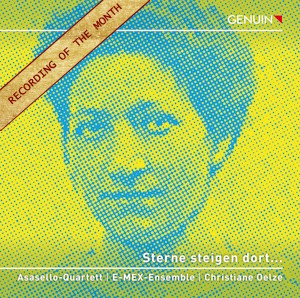
Albert Maria Herz (1878-1950)
Sterne steigen dort… (Stars rise afar…)
Fünf Lieder auf Worte von Stefan George für Singstimme und großes Orchester, Op. 7 (1929, arr. for ensemble by Christoph Maria Wagner)
Vier Kleine Stucke for string quartet, Op.5 (1928)
String Quartet in B minor, Op.6 (1930)
Rundfunkmusik (Radio Music) for 8 instruments, Op.9 (1930)
Johann Sebastian Bach (1685-1750)
Partita for solo violin No.2 in D minor, BWV1004: Chaconne (arr. Herz for string quartet)
Christiane Oelze (soprano), Asasello-Quartett, E-MEX-Ensemble
rec. 2022/2023, Beethovenhaus Bonn & Deutschlandfunk Kammermusiksaal Cologne & WDR Funkhaus Cologne, Germany
Texts and translations included
Genuin GEN23837 [78]
Until this CD came along, I had never heard of Maria Herz, or Albert Maria Herz as she later became known. She was born Maria Bing in Cologne and studied music in the city’s conservatory. In 1901 she married Albert Herz in Cologne and the couple subsequently moved to England. Albert had earlier relocated there because of the strong anti-Semitism he encountered. They went on to have four children. Maria became active in the music scene of Yorkshire and took some lessons in harmony and composition in Bradford with Arthur E. Grimshaw, and began composing. Whilst visiting Cologne in 1914, the family were caught up in the outbreak of war and couldn’t return to England. Albert was drafted into the German army. In 1920 he was to die during the flu epidemic, and from then on Maria signed her compositions Albert Maria, as female composers were hardly taken seriously at that time. The years 1920 to 1935 were her most productive as a composer, and she became closely acquainted with such celebrities as Gregor Piatigorsky, Emanuel Feuermann, Gaspar Cassadó, Hermann Abendroth, Otto Klemperer and Hans Rosbaud. After the war she emigrated to the States. She died in New York. She composed songs, chamber music, concertos, orchestral music and choral works.
Arrangements of Bach’s Chaconne are nothing out of the ordinary, in fact it is one of the most often arranged compositions in all of music. Versions for virtually every instrument have sprung up, including organ, flute, saxophone, clarinet and even the marimba. Perhaps the most well-known are the two versions for solo piano by Johannes Brahms and Ferruccio Busoni. Herz penned the string quartet arrangement in her maturity. The author of the booklet notes speculates that it could have been composed as a tribute to her late husband in much the same way as Bach wrote it as a memorial to his wife. This accomplished score works very well from the commanding opening, through the gradually increasing complexity of the variations, to the noble ending. The arrangement certainly maintains all the power and grandeur of Bach’s immortal masterpiece.
The Fünf Lieder auf Worte von Stefan George are heard here in arrangements for ensemble by Christoph Maria Wagner. German texts and English translations are located at the back of the booklet. The opening line of the first lieder “Sterne steigen dort” (Stars rise afar) provides the title for the album. These five Lieder on words by Stefan George exist in versions for voice and piano and in an orchestral version. Christoph Maria Weber has arranged them for a whittled-down ensemble, lightening the orchestral textures and giving the piano a subordinate role. The songs roam openly in free tonality and harmonic sophistication. The E-MEX Ensemble offer sensitive support to the singer, the glorious soprano Christiane Oelze who is, without doubt, a first-rate interpreter of these intriguing songs.
The E-MEX Ensemble also perform the Rundfunkmusik (Radio Music) for 8 instruments. It’s cast in four short movements and the mood throughout is joyous and playful. The adept scoring is colourful and engaging, and I’m sure it provides a great source of fun for the players. A teasing Allegro opens the work, followed by a ruminative Andantino. An Allegretto comes third, and it takes its steps tentatively before a chirpy Allegro giocoso brings down the final curtain.
Asasello-Quartett performs the two works for string quartet. The earliest work is the Vier Kleine Stucke. It opens confidently, but this assuredness melts into wistfulness and regret in the Adagio second movement. A scherzo-like third movement precedes a defiant finale, where hesitant doubt are never far away.
Two years later Herz composed her String Quartet in B minor. It’s a much more substantial work, structured in four movements. After a meandering opener there’s a sprightly Allegretto. It’s the Lento third movement which forms the heart of the work. Both warm and tender, it’s immersed in deep thought. The finale, by contrast, is jaunty and animated. Both string quartet works get fervent, warm and polished readings from the Asasello-Quartett, who play with accomplished musicality, authority and real sensitivity.
This is a wonderful disc and a very welcome introduction to the music of Albert Maria Herz, and we hear superbly committed and well-recorded performances from all concerned. I very rarely gripe about booklet notes, especially when it doesn’t materially affect the listening experience. Here, I must flag up the disappointingly poor and thin information about the music performed. All the same, the German texts and English translations of the Fünf Lieder are gladly received.
Stephen Greenbank
Help us financially by purchasing from





















